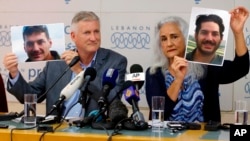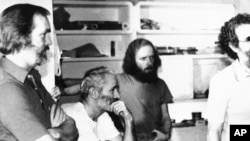The White House faces constant pressure from more than 60 American families whose relatives are held hostage overseas, including one whose family, this week, marks 10 years without him.
Austin Tice has been missing in Syria since August 2012, giving him the grim record of being held longer than any other American journalist. Syria's government denies holding him. State Department spokesperson Ned Price refuted that.
"We have engaged extensively with Syrian authorities to try to get Austin home, including directly with Syrian officials," he said. "But as I mentioned at the time, Syria has never acknowledged holding him. We continue to believe that Syria has, now, an opportunity to help release a U.S. national. We will continue to pursue every avenue we conceivably can to secure Austin's prompt release."
Intergovernmental hostage situations are rarely straightforward and often escalate to the highest levels of government, making them some of the most diplomatically delicate and emotionally fraught tasks for any White House. Earlier this year, President Joe Biden's administration oversaw a prisoner swap for the release of Trevor Reed, a former Marine held since 2019 in Russia.
Last month, after basketball star Brittney Griner appeared in a Russian court on drug charges, the administration refined its hostage policy, allowing agencies to impose sanctions and visa bans on both state and nonstate actors who are holding Americans.
Push for an offer
Those campaigning to free Tice welcomed these changes and are calling on Biden to act.
Bill McCarren, who heads the Free Austin Tice campaign, told VOA that the Syrian government laid out requests in a 2020 meeting with U.S. officials.
"Now what needs to happen is an offer needs to be put on the table, and it is the United States that needs to do that," he said. "That is where the ball is right now."
McCarren said Syrian officials, in the meeting, raised three issues: a reduction in U.S. troops in Syria, sanctions relief and limited diplomatic engagement in Washington and Damascus.
"It's not a crazy idea. These are things that we should be willing to engage with, with them and discuss with them," he said. "And so far, that still is yet to be done."
But those who have worked in the West Wing say this process can be excruciatingly complex and hinge on strong negotiation.
Confidence in negotiators
"The president has to have confidence in his negotiators," said Philip Bobbitt, now a Columbia University law professor who was working at the White House on January 20, 1981, as President Ronald Reagan was being sworn in – and Iran's supreme leader released 52 U.S. hostages after 444 days.
"If he tries to jiggle their elbow to get the hostages back with more dramatic threats, or with more dramatic concessions, he'll really, even if he succeeds, in the instant case, make things more difficult for the United States if hostages are taken again in the future. So he has to find negotiators in whom he has confidence, give them a charter and keep steadily to that."
Bobbitt, who worked under then-White House counsel Lloyd Cutler and was President Jimmy Carter's negotiator during the crisis, also described for VOA what negotiation can look like behind the scenes, with this account of how the Carter administration persuaded Tehran to release the hostages:
"This occurred at a club in New York City, in the late afternoon, shrouded in darkness and silence, a secret meeting with a representative of the Bank Markazi, which was the Iranian state bank. And Cutler said that the money that we had frozen of Iranian assets was not coming back," Bobbitt said.
"The second proposal Cutler made that afternoon ran sort of like this: He said that he believed that the administration could persuade Congress to put a cap on civil lawsuits brought by the families of the hostages. And if we did not do that, then Iran would be plagued for decades by lawsuits brought in the United States before very sympathetic juries. … And it was that argument that I believe actually turned the key."
For families on the sidelines, this complicated, high-level dance between governments can be a tormenting experience — and negotiations can still fail. Diane Foley learned that eight years ago this week.
Her son James, a journalist, had been kidnapped nine months earlier in Syria by a militia group loyal to Syria's president.
Former President Barack Obama mounted a failed rescue mission. Then, on August 19, 2014, the captors released a chilling video, showing Foley. He had been decapitated.
Progress seen
Foley's mother said she welcomed the changes that have been made since. She spoke to VOA as she prepared to travel to Virginia for the sentencing of one of the men convicted in her son's kidnapping and murder.
"There's definitely been progress," she said, "I really feel there is. In 2015, you know, the hostage recovery fusion cell was created, the special envoy and the whole hostage enterprise. When Jim was in captivity, there was no such thing. So at least we have people accountable for the return of Americans."
She also stressed that officials need to work with hostages' families.
"It is essential that families be involved because they're the best advocate," she said. "They are the ones that will not give up. They're the ones that will always do what they can to get their loved one home."
And McCarren argues that the Foley family's path to justice shows that the U.S. government isn't playing a zero-sum game.
"This is not a question of, you can either get the hostage out, or you can hold the person accountable by justice," he said. "You can do both things. You can do both things. And that's what I think the rigidity of the U.S. policy does not allow for."









